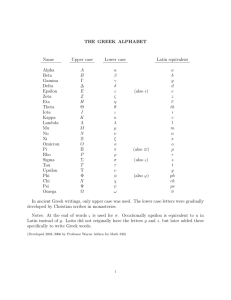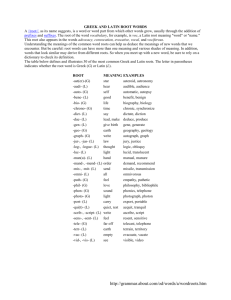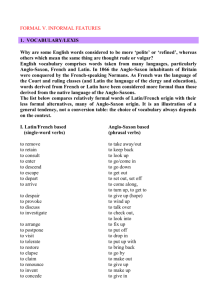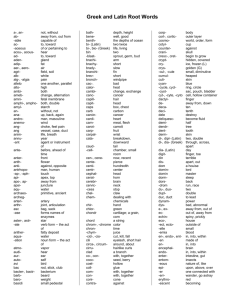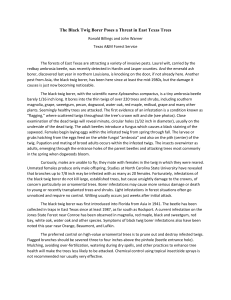Words from the Woods: Derivations of Common Tree and Forest
advertisement
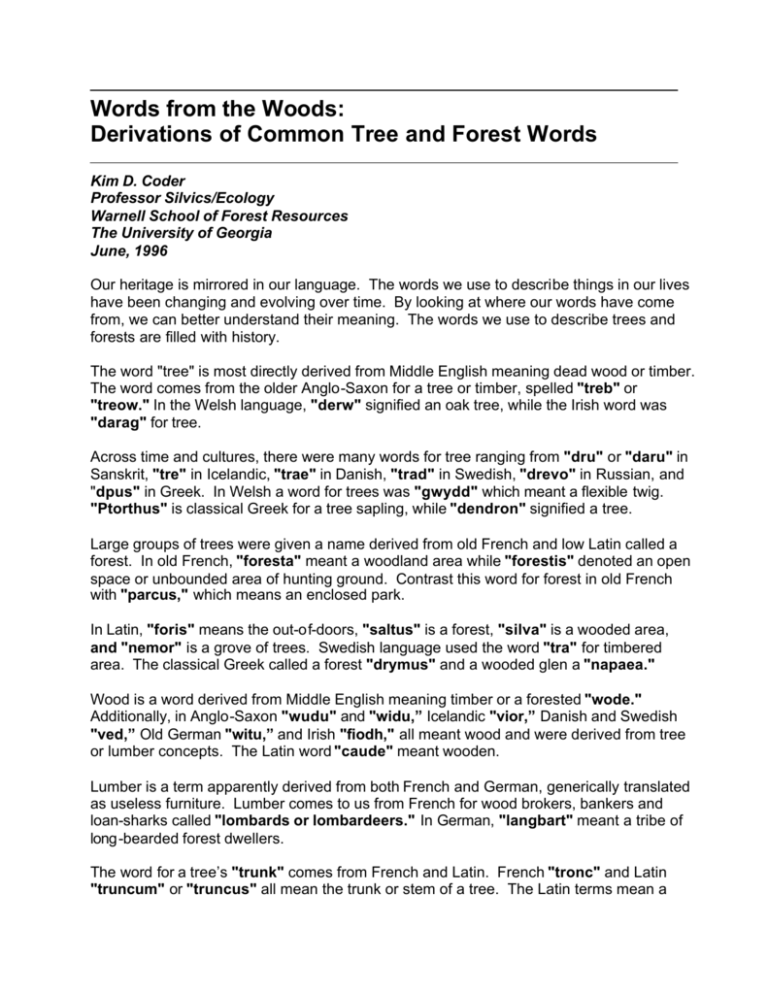
Words from the Woods: Derivations of Common Tree and Forest Words Kim D. Coder Professor Silvics/Ecology Warnell School of Forest Resources The University of Georgia June, 1996 Our heritage is mirrored in our language. The words we use to describe things in our lives have been changing and evolving over time. By looking at where our words have come from, we can better understand their meaning. The words we use to describe trees and forests are filled with history. The word "tree" is most directly derived from Middle English meaning dead wood or timber. The word comes from the older Anglo-Saxon for a tree or timber, spelled "treb" or "treow." In the Welsh language, "derw" signified an oak tree, while the Irish word was "darag" for tree. Across time and cultures, there were many words for tree ranging from "dru" or "daru" in Sanskrit, "tre" in Icelandic, "trae" in Danish, "trad" in Swedish, "drevo" in Russian, and "dpus" in Greek. In Welsh a word for trees was "gwydd" which meant a flexible twig. "Ptorthus" is classical Greek for a tree sapling, while "dendron" signified a tree. Large groups of trees were given a name derived from old French and low Latin called a forest. In old French, "foresta" meant a woodland area while "forestis" denoted an open space or unbounded area of hunting ground. Contrast this word for forest in old French with "parcus," which means an enclosed park. In Latin, "foris" means the out-of-doors, "saltus" is a forest, "silva" is a wooded area, and "nemor" is a grove of trees. Swedish language used the word "tra" for timbered area. The classical Greek called a forest "drymus" and a wooded glen a "napaea." Wood is a word derived from Middle English meaning timber or a forested "wode." Additionally, in Anglo-Saxon "wudu" and "widu,” Icelandic "vior,” Danish and Swedish "ved,” Old German "witu,” and Irish "fiodh," all meant wood and were derived from tree or lumber concepts. The Latin word "caude" meant wooden. Lumber is a term apparently derived from both French and German, generically translated as useless furniture. Lumber comes to us from French for wood brokers, bankers and loan-sharks called "lombards or lombardeers." In German, "langbart" meant a tribe of long-bearded forest dwellers. The word for a tree’s "trunk" comes from French and Latin. French "tronc" and Latin "truncum" or "truncus" all mean the trunk or stem of a tree. The Latin terms mean a stem, a wooden piece that is cut-off, or a tree that is maimed. The Greek term for a tree trunk was "premnum" Latin called a tree trunk a "caudex." Bark on a tree trunk is "the rind of a tree" in Scandinavian languages and is the base of our current word. The word for branch is derived from French and Celtic languages. The oldest definitions mean an arm or brace. Latin, Irish, and Welsh all have a word close to our modern word, all meaning the arm of a tree. Old French derived a term for branch meaning to grasp with both arms. Classical Greek used the term "ozot" for branched, "trechnus" for a b ranch, and "clon" for a branch or twig. A twig is considered a shoot of a tree or a small branch. In the Anglo-Saxon language, a single "twig" or several "twigu" could be found on a larger branch. Earlier meanings for twig came from then forking off o f a branch. The Dutch "twijg" or German "zweig" or "swiesel" mean a forked branch. Latin called a twig or sprout a "surculus." The word bud is from Middle English "budde" or "budden." In Dutch a "bot" or "botten" means to bud or sprout. Leaf is derived from the Middle English terms "leef,” leues,” or "leves." Anglo-Saxon, Dutch, Icelandic, Swedish, and Danish all have similar words for a leaf or foliage. The Russian term "lepeste" and Lithuanian "lopas" both mean leaf. German uses the word "laub" which has a derived meaning from a strip of woody tissue or a scale, harking back to old Spring days when trees were stripped of their foliage to feed animals. The care and maintenance of single trees within a community forest is called arboriculture. The term "arbor" means a tree in Latin. Sometimes this word is confused with the Latin "arbour" or the Middle English "erbere" which means a small garden or kitchen orchard. What do the words used everyday actually mean, or what did they mean? What is in a word? Pieces of our cultural history can be glimpsed by tree and forest words. THE UNIVERSITY OF GEORGIA AND FT. VALLEY STATE UNIVERSITY, THE UNITED STATES DEPARTMENT OF AGRICULTURE AND THE COUNTIES OF THE STATE COOPERATING. THE COOPERATIVE EXTENSION SERVICE OFFERS EDUCATIONAL PROGRAMS, ASSISTANCE, AND MATERIALS TO ALL PEOPLE WITHOUT REGARD TO RACE, COLOR, NATIONAL ORIGIN, AGE, SEX, OR DISABILITY. A UNIT OF THE UNIVERSITY SYSTEM OF GEORGIA. AN EQUAL OPPORTUNITY / AFFIRMATIVE ACTION ORGANIZATION COMMITTED TO A DIVERSE WORK FORCE. UNIVERSITY OF GEORGIA SCHOOL OF FOREST RESOURCES EXTENSION PUBLICATION FOR 96-048. 6/1996.

